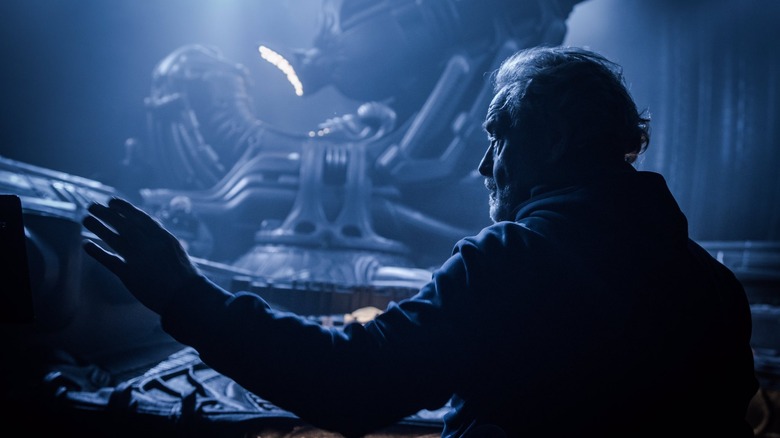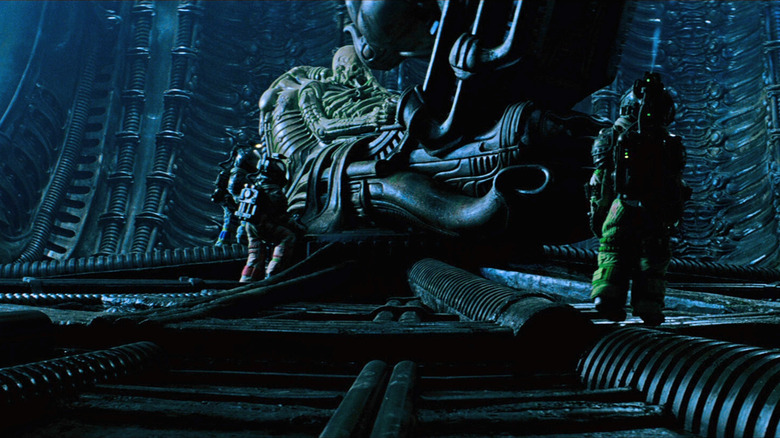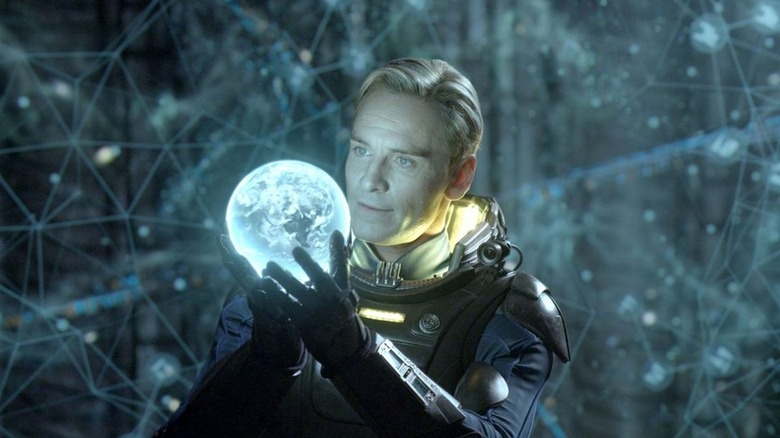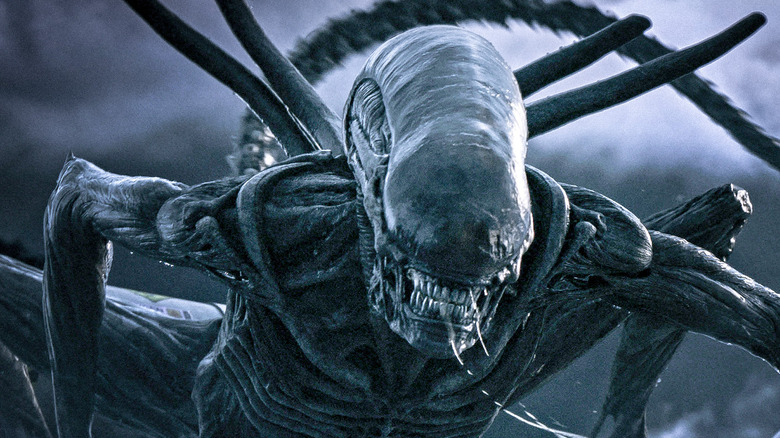Will There Be A Sequel To Alien: Covenant? Here's What We Know
(Welcome to Will There Be a Sequel?, a series where we answer that question and explore what comes next.)
In 2012, Ridley Scott returned to the world of "Alien" with the prequel movie "Prometheus." In 2017, the story continued with "Alien: Covenant." Scott said in multiple interviews that he planned to keep the story going. But so far, that hasn't happened. In the time since Scott started this new prequel series, 20th Century Fox, owners of "Alien," was engulfed by Disney. That means the acid-bleeding Xenomorphs are now the property of the House of Mouse, which I think we can all agree is a little weird. As of the writing of this story, Disney is developing an "Alien" TV series with Noah Hawley for FX on Hulu.
But what of the films? Will Ridley Scott get to make at least one more entry and close out his prequel trilogy? Or has the airlock for that opportunity closed?
Something New
Ridley Scott's "Alien" is an immortal classic. A scary, brilliantly crafted blend of sci-fi and horror that remains just as effective today as it was back in 1979. But Scott stepped away from the franchise following that first film, with other directors, including James Cameron, stepping in for a host of sequels. This might sound like a controversial opinion, but I am of the mind that all of the "Alien" sequels have their charms. Are these movies as good as the first "Alien"?" Oh, hell no. But they all bring something fun to the table, be it the bleakness of David Fincher's "Alien 3" or the unapologetic weirdness of Jean-Pierre Jeunet's "Alien: Resurrection." The "Alien vs. Predator" movies are a different story, but let's go ahead and pretend they don't exist, okay?
In the early 2000s, Scott toyed with the idea of returning to the world of "Alien," and he and James Cameron actually got together to start brainstorming ideas. These ideas never really went anywhere, and Scott's involvement with a new "Alien" movie got put on the back burner until around 2009. At this time, Scott started to show interest in a new "Alien" movie, and screenwriter Jon Spaihts was tasked with writing the script. Spaihts wrote something that served as an almost direct prequel to the first "Alien," but Scott nixed that idea. He was open to the prequel idea but he didn't want it to simply repeat the story beats of the original film. He wanted something new.
Paradise Lost
The end result was "Prometheus," a film that opened in 2012. While there are plenty of elements that connect "Prometheus" to the first "Alien" movie, it's also a much different film. Where "Alien" leans into horror, "Prometheus" is more concerned with existential questions involving humanity's search for a higher power. The characters here aren't chasing after aliens; they're looking for gods. Reaction to "Prometheus" was a bit mixed, with many criticizing some of the dumb decisions some characters make (I'd argue that in retrospect, here in 2021, where we have brainwashed loons hindering the pandemic recovery by taking horse drugs instead of a vaccine, Scott's dumb characters weren't so unbelievable after all).
While the reaction to the film may have been mixed, the film itself was a big hit, hauling in $403.4 million on a $120–130 million budget. And those are the types of numbers that makes Hollywood want a sequel. As luck would have it, Ridley Scott was prepared for this. In an interview in 2015, Scott revealed he wasn't just planning one sequel to "Prometheus," he was planning as many as three sequels. When asked if the "Prometheus" sequel would answer lingering questions, Scott replied:
"Yes, but it won't be in the next one. It will be in the one after this one or maybe even a fourth film before we get back into the 'Alien' franchise... The whole point of it is to explain the Alien franchise and to explain the how and why of the creation of the Alien itself. I always thought of the Alien as kind of a piece of bacterial warfare. I always thought that original ship, which I call the Croissant, was a battleship, holding these biomechanoid creatures that were all about destruction."
The first sequel eventually was announced as "Alien: Paradise Lost," before the title changed to "Alien: Covenant." And even then, Scott continued to insist there were more movies to come. "So I'm now going to the next one, which is the next evolution directly connected with the first one," he said. "When that's finished there'll be another one and then another one, which will gradually drive into the back entrance of the film in 1979."
Racing Towards Our Own Extinction
Released in 2017, "Alien: Covenant" was much more of an "Alien" movie than "Prometheus," as you can probably guess from the title. But while Scott used more "Alien" iconography here, going so far as to introduce Xenomorphs, "Covenant" is not an "Alien" rehash. Like "Prometheus," it's a much different experience. It's a dark, cynical experience that seems to suggest Scott has had enough of humanity and he's fine with us being wiped out (can't say I blame him). The end result was a moody, gothic film that was somehow even more polarizing than "Prometheus." Lots of folks were unhappy that this wasn't just another "Alien" movie with all the familiar trappings, but others were happy to see Scott go in this new direction.
That included me. I was mixed on "Prometheus" — I think it has some good ideas but they're not all executed very well. "Covenant," however, worked for me, and worked well. I loved the gothic atmosphere, I loved the harshness of it all. And I loved the continuing story of David, the murderous android played by Michael Fassbender, who was first introduced in "Prometheus." David is understandably disgusted by humans and he has no problem doing terrible things in his quest to create something better. Now, to be clear, I think the film's idea that David did some experiments that resulted in the Xenomorphs is rather silly. I didn't need to know where the aliens came from – I was fine with them remaining mysterious lifeforms from somewhere else. But beyond that, I found a unique film that was far darker than the usual Hollywood studio fare. As I wrote in my review:
Scott's thesis with Prometheus and Alien: Covenant seems to be that as a species, human beings are fatally flawed. We are racing towards our own extinction, and apparently incapable of putting on the brakes. It's a nasty, nihilistic theology, and it makes sense that it would turn so many people off. Scott doesn't want to make his audience feel good; he wants us to stop and think, and perhaps realize that it's all kind of hopeless in the end.
With all that darkness in mind, I suppose it's not a huge surprise that "Alien: Covenant" underperformed at the box office. Its total global intake was $240 million against a production budget of approximately $100 million, and that doesn't even figure in marketing costs. It was not what the studio wanted to see, and it cast the future of the franchise in doubt.
The Future
A few days before "Alien: Covenant" opened in theaters, Ridley Scott was already talking about the next film. The director said that if "Covenant" did well at the box office he would start shooting the next film in 14 months. But that didn't happen. During this time there was some talk about Neill Blomkamp making his own "Alien" movie — a film that would ignore most of the sequels and serve as a direct follow-up to "Aliens." But Blomkamp's film never got off the ground, and by all accounts, it's completely dead now.
But what of Ridley Scott and his potential movies? In December of 2017, even after the low box office returns of "Covenant" were in, Scott was still talking about making more movies, saying:
We are [going to make another], we are. I think what we have to do is gradually drift away from the alien stuff. People say, 'You need more alien, you need more face pulling, need more chest bursting,' so I put a lot of that in Covenant and it fitted nicely. But I think if you go again you need to start finding another solution that's more interesting. I think AI is becoming much more dangerous and therefore more interesting.
In 2018, that talk continued. Scott said that if the film got made it would return to the planet LV-426, which is where the characters in the first "Alien" ran afoul of those alien eggs and the face-huggers within. John Logan, who wrote "Covenant," was on board to write the script for this new movie, which would be called "Alien: Awakening." But the project continued to stall.
In 2020, Scott was still beating the drum, saying:
"What I always thought when I was making the first one [was] why would a creature like this be made and why was it traveling in what I always thought was a kind of war-craft, which was carrying a cargo of these eggs. What was the purpose of the vehicle and what was the purpose of the eggs? That's the thing to question — who, why, and for what purpose is the next idea, I think."
But later that same year he seemed ready to maybe admit defeat. Sort of. He said a potential new movie was "in process," adding:
"We went down a route to try and reinvent the wheel with Prometheus and Covenant. Whether or not we go directly back to that is doubtful because Prometheus woke it up very well. But you know, you're asking fundamental questions like, 'Has the Alien himself, the facehugger, the chestburster, have they all run out of steam? Do you have to rethink the whole bloody thing and simply use the word to franchise?' That's always the fundamental question."
Since then we've heard very little regarding another Ridley Scott "Alien" movie. Scott clearly shows no signs of slowing down — he has two movies due out this year, "The House of Gucci" and "The Last Duel." He also carries a considerable amount of clout in the business. Could that be enough to convince Disney to throw some money his way for at least one more "Alien" movie? I kind of doubt it. Perhaps Disney is waiting to see how Noah Hawley's "Alien" TV show turns out first before they greenlight yet another movie. For now, we're just going to have to wait and see.




